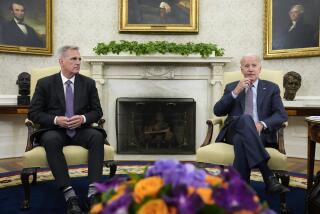Talks Revealed Much Sympathy for U.S. Demands
- Share via
TOKYO — Cynics, Japanese and American alike, have called the U.S. government the only real opposition party in Japan, and the trade agreement announced Friday tends to support their point of view.
After six weeks of warnings about a crisis in bilateral relations, plus four days of negotiations and a strong push from President Bush himself, Japan finally agreed to a series of reforms that Prime Minister Toshiki Kaifu said will benefit the Japanese consumer.
Clearly, however, Japan’s primary motive had nothing to do with the consumer. It was fear of a rift in relations with Washington.
Throughout the discussions that led to the accord, all but one of Japan’s opposition parties looked on from the sidelines. The Socialists said nothing, and two middle-of-the-road parties stood aloof.
Only the Communists spoke up, condemning U.S. demands for increased access to Japan’s markets as interference in Japan’s internal affairs.
Members of Kaifu’s Liberal Democratic Party with urban constituencies banded together to resist a U.S. demand for repeal of a law that protects neighborhood stores--about 1.6 million of them--against competition from supermarkets and department stores.
The opposition-controlled Tokyo Metropolitan Assembly unanimously adopted a resolution opposing repeal. It said it could lead to confusion, a word used here for what Americans call competition.
Kabun Muto, the minister of international trade and industry, also lined up with the small shopkeepers.
The prime minister, before his March meeting with Bush in Palm Springs, had talked about consumer interests but had done little to promote them. Only after Bush made it clear to him that the bilateral relationship was at stake did Kaifu take up the cudgels for reform.
Still, the process of working out the accord has uncovered an astonishing degree of sympathy for the United States here and support for its advocacy of a more open Japanese economic system.
Throughout the discussions, the Japanese news media sought out advocates of government decontrol and publicized their criticism of control-minded bureaucrats. Editorials in Japanese newspapers were overwhelmingly for reform.
One newspaper, the Nihon Keizai, conducted a poll and found that 85.9% of the people surveyed were in favor of full or at least partial acceptance of the U.S. demands. Slightly more than half supported opening even the politically sacrosanct rice market, although with quotas.
Taizo Watanabe, spokesman for the foreign ministry, said the newspaper poll marked “the first time . . . the common sense of the Japanese people . . . has been shown with such clear-cut figures.”
Even businessmen joined in. The Federation of Economic Organizations issued a position paper supporting most of the U.S. demands.
Isamu Miyazaki, chairman of the Daiwa Institute of Research and former vice minister of the Cabinet’s Economic Planning Board, pointed to troubles on the Tokyo Stock Exchange as proof that many business and financial leaders do indeed support change.
Although stock prices started sliding at the beginning of the year, they did not start to plunge until after the ruling Liberal Democratic Party scored an unexpected and decisive victory in the lower house elections of Feb. 18.
The business world reacted with despair, Miyazaki said in an interview, because “everyone thought the Liberal Democrats had won so many seats, they would refuse to change.” On Friday, after the reform measures were approved, stock prices soared.
Miyazaki, who served on the commission, said that since 1986, when the so-called Maekawa Commission called for government deregulation, “there have been some cases in which a requirement for a government permit has been eased to require only notification.”
“But there are still more than 10,000 business actions that require permits or approval,” he added, just as there were four years ago.
Friday’s accord, actually an interim report on what is known formally as the Structural Impediments Initiative, spelled out a large number of areas in which Japan promises to make improvements.
More to Read
Sign up for Essential California
The most important California stories and recommendations in your inbox every morning.
You may occasionally receive promotional content from the Los Angeles Times.













